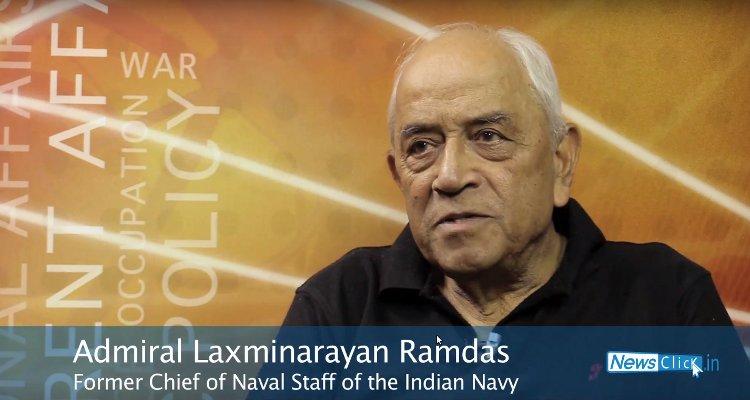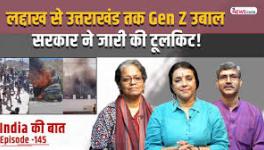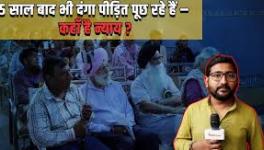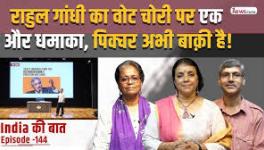Admiral Ramdas: India Cannot Be a Hindu Rashtra
Newsclick interviewed Admiral. Laxminarayan Ramdas, former Chief of Naval Staff of the Indian navy on the question of nationalism and the retired soldiers' march to protesting incidents in the Jawaharlal Nehru University (JNU). He said, a protest in an institute should not be treated as anti-national. All Indians have the right to air their views, to dissent and protest. Dissent should not be considered as enmity to the nation. JNU is a national level prestigious institute, and definitely there will be students from various places of the country with different characteristics. If somebody doesn’t have correct understanding of the nation, it is not only the problem of that individual but also of the society where that person has grown up, says Admiral. Ramdas.
The former Naval Chief also talked about Indo-Pak relationships. He said, both the nations don't really understand the role of a third party in the issues. India should not treat Pakistan as an enemy. Many in Pakistan don't subscribe to the idea of Islamic state, which Zia-ul-Haq made several years after independence. It is the same idea RSS want in India to be -- a Hindu rashtra. This notion is declined by the majority of Indians. He demanded that India should uphold the principles of its well defined secular constitution rather than spreading hatred.

Rough Transcript:
Prabir Purkayastha (PP): Hello and welcome to Newsclick. Today, we have with us Admiral Ramdas and would discuss the current phase of nationalism which is being propagated across the country. This militarised version of Nationalism in which the retired army officers march and they want a tank to be placed within the University campus. Admiral Ramdas, this is something qualitatively new. We did not have really retired army officers had marching against a university and that too a well known leading universities of the country. Do you think this indicates a phase in Indian politics where the military is also sought to be politicized?
Admiral Ramdas (AR): Army normally marches against the enemies and if we re considering our Jawaharlal Nehru University an enemy, then there is something then there is something radically wrong with us. So that is the way they interpret nationalism and I certainly don't. I think every Indian is an Indian. This kind of infiltration into Universities is not at all called for and specially under the flag of nationalism because all of us as I said, I think know exactly what it means, what it involves and frankly, this kind of imagery of holding a flag high or keeping a tank here I mean they are all right, they can put a tank here, what do I do? Does the navy bring in a warship there and say look at it. So think this is all I hope this is only a transitory phase because I after 64 years of independence we have to teach our own children what is nationalism, what is India and what is the tricolor is something wrong with the parents and people do they call of nationalism.
PP: The argument here is our soldiers are laying down their lives and these people are disrespecting that sacrifice. Now, the issue really is that the students have always been interrogating various things and it is not a question of particular nationalism but different kinds of nationalism that's also being interrogated. Can we discuss this so on. So do you think that this also straitjackets the things the way we want to look at the nation that it is a powerful masculine militarized nation that is what we really want, do you think that is the ideology which is playing behind this?
AR: I really don't know what is the ideology. But all I can say this is a very strange kind of behaviour on the part of those who represent this kind of idea because it does not call for certainly the armed forces to go into any university which is after all a seat of learning, youngsters who come together from all walks of life from all parts of India, specially Jawaharlal Nehru University which is a microcosm of India itself and there will be people representing from all walks all kinds of views, all kinds of attitudes, all kinds of ideas and all kinds of criticism each one must be prepared to face because that is the beauty and strength in a way of our country that we have people at that age coming up with ideas, coming up with their dissenting views on certain policies and to my way of thinking is all to the good. That does not make them anti-national or anything of that kind. It only shows that we are bubbling dynamic society.
PP: We should be able to survive a few slogans if it were.
AR: Absolutely, slogan shouting is very common particularly I think with politicians and then it comes down to the university who is at fault. Not the students. Others who shout slogans should realize that it is also an effect that happens in universities.
PP: And if you shout slogan against a community which is that Muslims should be killed, Agra for instance. The different kinds of slogans they shouted, they really destroy the fabric of the country not a few students shouting something or other.
AR: I think people in responsible position specially who own public office whether it is within the government, outside the government I think they must all understand their responsibilities and not make such statements because India is a secular, well, those who don't like the word secular, India is a country with all kinds of people who follows all kinds of religions and faiths and languages and so on. We have never let that come in our way of our functioning. And I believe that should be the only way and we don't even have to talk about it. It's all laid down in our what I call the only holy book that I follow is called the constitution of India where a lot of time, nearly two years were spent people discussing it and finally it took shape and we adopted it in November 1949 if I am not mistaken. So almost two years went in just creating the constitution. There were lot of debates, pro anti and finally that emerged.
PP: It is interesting because actually the kind of complexity that we have in India very few countries really have and creating that kind of a nation was in some sense unique achievement.
AR: Absolutely, I don't think anywhere in the world you can replicate in India. I don't mean it in negative sense but in a positive sense because here is a land of people from all over the world who came thousands of years ago, who made India their home, and we are very proud of that because we were all kinds of people, all kinds of religion, all kinds of faith, some in smaller number, some in bigger number, all kinds of languages and we have lived happily and suddenly I don't know there seems to be some kind of need for somebody to create, disturb the pot as it were you know.
PP: You have also been a strong votary of India and Pakistan friendship and has been a part of trying to get Indian people to people contact with Pakistani people and trying to build bridges. How do you see this today and in the context of what's happening? Do you think that we have a possibility of actually rebuilding our relationships of course it takes both sides to do not one.
AR: It's not so much of a possibility as indeed a responsibility which we have to demonstrate by much better neighborhood management. We have taken our neighbors for granted all these years and if anything has to be achieved, it has to be achieved politically because we are a country which believes in that system. We are a democracy, we have got a political system, we follow that system and have done all these years and suddenly to find that nothing is happening or something is happening you know something could happen, I think in my own experience I can say we were moving along nicely but every three steps you take you slide back two. It is not a very happy kind of development but that's been going on and on and on. The reason to my way of thinking is largely because both India and Pakistan have not understood the game the third power are playing who benefit a lot by continuing conflictual situation between India and Pakistan and that is because their main aim is to sell their arms to both the warring...of want of a better expression ..individuals who do this marketing, there must be something in it because now a days big money involved. India emerges as largest importer of arms last year. Frankly, we thought that after 71 then East Pakistan becoming Bangladesh something else and something else and the people to people contact improving and maybe we will come to some kind of understanding. I think it is important we do and the same applies for relations with China. I think we have to come to some political understanding and be realistic. We can not carry on and still sing the same song as a British had. We are no longer a colony.
PP: Last question. You know when we became two nations Pakistan and India. India was the secular inclusive country that was the constitution we should have but Pakistan based an Islamic state and the military took over at a certain point. The military became politicize and also under Zia Ul Haq it became highly Islamic. In fact, that was the transformation of the Pakistan state. Do you think we are following the similar patterns?
AR: First let me, forgive me, I must correct you when Pakistan emerged with Jinnah as the President, they had also secular state and a constitution that is secular very much like what we have. But after the assassination, of course the death of Jinnah and Liaquat Ali Khan who was assassinated, then were the great cry to somehow you know with all these big things happen they want to change things. So then this Islamic Republic of Pakistan mainly under Zia Ul Haq at later. It happened around that time. So that is the first thing we must understand. Admittedly, we were partitioned. We had terrible times both on our sides and on their sides but having somehow gotten over that we must appreciate that he feelings in Pakistan, the feelings in India have been whipped up over time and we understand that there is a great Islamic feeling in Pakistan but there are a large number of people also who do not believe in their whatever so called Islamic Republic says. Like in India, I think what has been understood you can respect it over the last six and a half decades it is now suddenly upset or disturbed by the government or RSS, they want to have Hindu Rashtra. Now, we are not a small island in Pacific that you can say, any extras throw you out. We can't do that. We have over 150 million Muslims in this country, they have lived here, their grandfathers have lived here, their great great grandfathers have lived here. They have borne here, this is the part of their own land. Why should we now distrust them? Just because 1947, we had charted ourselves a particular constitution which some people did not agree? And they still don't agree. So I think this requires some understanding of the whole realities. We can't bulldoze them to the Arabian sea or Bay of Bengal and say all the minorities go away. That's why you hear often this phrase 'Arey nahin to Pakistan Bhej Do'. Arey Pakistan Koi Dustbin Hain Jaakar Phenk to Udhar. They are not there waiting for you. So therefore, we must be realistic and none of these people want to leave. If tomorrow I were to be told you tgo to Pakistan, if you were to be told to go to Pakistan, gone mad.
PP: Thank you very much Admiral Ramdas. Hope to have you with us about this discussion.
AR: Thank you very much.
PP: That's all we have time today. Keep watching Newsclick.
DISCLAIMER: Please note that transcripts for Newsclick are typed from a recording of the program. Newsclick cannot guarantee their complete accuracy.
Get the latest reports & analysis with people's perspective on Protests, movements & deep analytical videos, discussions of the current affairs in your Telegram app. Subscribe to NewsClick's Telegram channel & get Real-Time updates on stories, as they get published on our website.
























